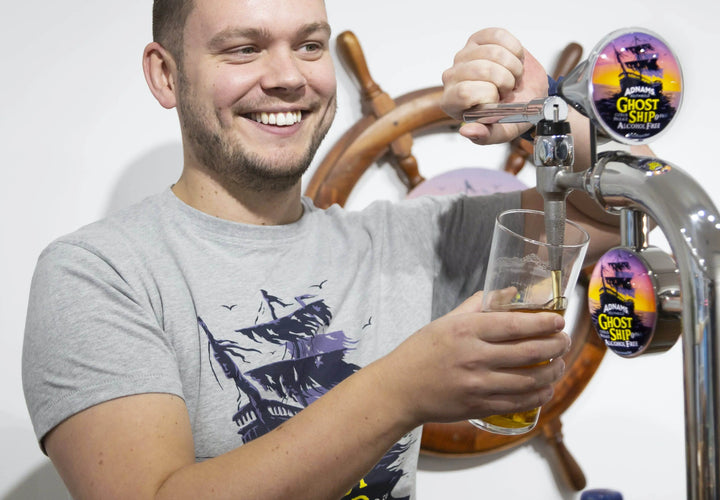Over 4 million people (*a) in the UK took part in ‘Dry January’ this year (2019) –around 1 in 10 people (*a) who decided to go sober or at least limit their alcohol intake for a month. Adnams’ Low and No Alcohol Ambassador, Tom Evans asks do these figures show the beginnings of a shift in our attitude towards alcohol or is this low/no alcohol phase just a fad?
People abstain from alcohol for many different reasons; health, pregnancy, New Year resolutions to be healthier or raising money for charity. Others have faced a realisation that they consume a bit too much, so taking a month off will help them reset, recharge and return to drinking alcohol with a new frame of mind. Studies have recently shown that 72% (*b) of people who participate in Dry January are still drinking less, six months later.
Here at Adnams, we've been producing low alcohol beer since 2011 starting with ‘Solestar’, at 2.7% abv, and over the next five years we reduced the abv to 0.9%. We wanted to get close to the flavour and sensation of a full-strength beer when we began creating Ghost Ship 0.5%.
Our process involves using a restricted fermentation brew, which means we don’t use as much malt and so there isn’t a lot of sugar for the yeast to ferment. Plus, we ferment at a colder temperature than normal and at lower yeast pitching rates. Basically, we do everything we can to slow down and restrict the fermentation of the beer, then we add a lot of dry hop.
We opted to use a process called ‘Reverse Osmosis’, which means we can filter out the alcohol yet still retain the full flavour of the beer. The cold temperatures during this process also help to lock the flavour in. We chose by far the best method of producing low alcohol beer, and by best, I mean best for flavour.
This means that Ghost Ship 0.5% has all the flavours and aromas of Ghost Ship 4.5%, but with almost all the alcohol removed. It’s all very high-tech allowing our Ghost Ship to sail away almost free from alcohol but retaining its original flavours and aromas.
Why is the low alcohol beer market growing? Personally, I believe it’s all about freedom of choice. Creating a dealcoholized beer means that a pint can be enjoyed as part of a healthy, balanced lifestyle. It’s a great choice for designated drivers and for anyone wishing to cut down on their alcohol consumption whilst still enjoying the taste of a good beer. Enjoying a drink socially is a great way to meet people, to exchange ideas and thoughts, and to build a strong, local community, so having the opportunity to be involved
with or without alcohol can only be a good thing.
In Germany and across continental Europe Low and No Alcohol beers have been around for a long time and proving very popular. Many big sporting companies are using alcohol-free beer to promote their events and sponsor their teams. With just 23 Kcal, 0.1g of sugar, 4.4g of Carbohydrates and 0.5g of protein per 100ml of Ghost Ship 0.5% it’s a popular choice for gym-goers post workout.
Has there been a shift in attitude towards alcohol? As more people start to take care of their mental well-being and physical health – and with more breweries and companies providing low or no alcohol alternatives, people have the option to cut down on alcohol. It is also becoming ‘trendy’ not to drink, or to drink less among the Millennials. The trend is gathering pace, with 42% of Millennials (*c) saying they are drinking less alcohol than they were three years ago.
Is it time for the industry to start changing? It is inevitable that the drinks industry will need to adapt to stay afloat. I do believe that it will be common for every pub to have a 0.5% or lower abv beer on tap and this category is bound to boom in years to come.
Adnams No Low and Low Drinks Ambassador Tom Evans is a passionate advocate for Adnams’ low alcohol drinks including Ghost Ship 0.5% Pale Ale and Adnams 0.5% wine range.
Tom will be joining the Going After Teetotallers- how do we make money from no/low alcohol panel at The London Wine Fair on Wednesday 22nd May. Find out more information here.
(*a) www.joinclubsoda.co.uk/smashing-dry-january
(*c) https://www.telegraph.co.uk/news/2017/09/25/millennials-dont-get-drunk-older-generation-did/
Share
